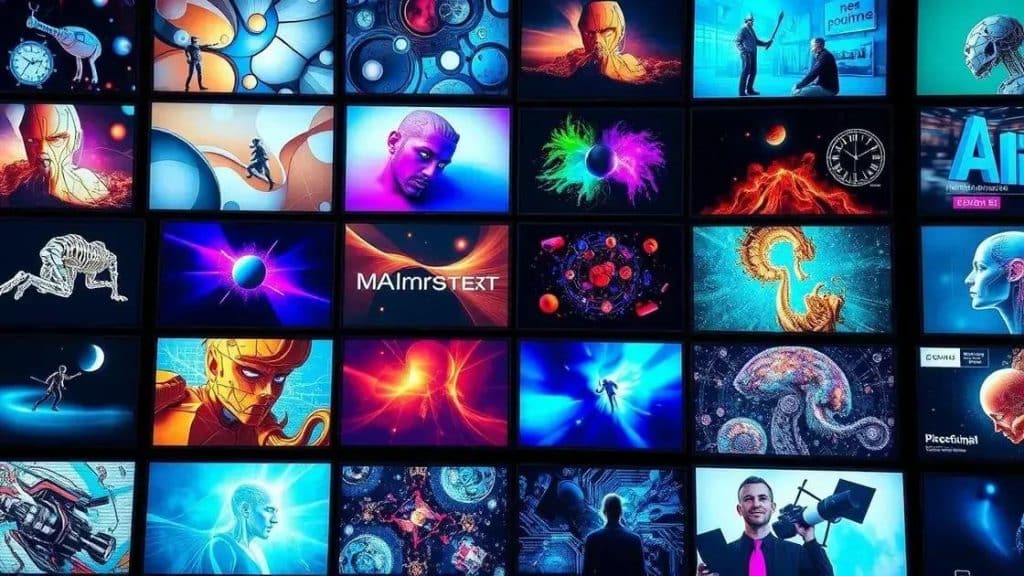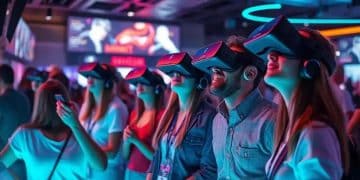Insights on ai-generated media trends shaping the future

Future predictions for AI in media include increased automation, enhanced personalization, and innovative storytelling formats that will transform how content is created and consumed.
Insights on ai-generated media trends are crucial for understanding the evolving landscape of digital content. Ever wondered how these advancements reshape the way we consume information? Let’s dive in!
Emerging trends in ai-generated media
As technology continues to evolve, emerging trends in ai-generated media are transforming how we create and consume content. Understanding these trends is crucial for anyone engaged in the media landscape today.
Increased Personalization
One of the most significant trends is personalized content creation. With ai algorithms, media can be tailored to meet individual preferences, making viewers feel more connected. This leads to higher engagement levels.
- Customized recommendations
- Content curated based on user behavior
- Dynamic adjustments during content consumption
The power of ai can dramatically enhance user experience, ensuring that the information is relevant and exciting.
Real-time Content Generation
Another exciting development is the ability to generate content in real-time. This means that news articles, social media updates, and even videos can be created immediately based on current events. Such immediacy keeps audiences informed and engaged, while also appealing to those seeking up-to-the-minute news.
By leveraging ai technologies, media outlets can achieve faster production rates without sacrificing quality. This not only helps news organizations stay competitive but also meets the growing demand for timely information.
Enhanced Visual Storytelling
Visual storytelling is evolving too. Ai-generated media utilizes advanced graphics and interactive elements to convey narratives in fresh ways. This shift towards immersive experiences captures audience attention more effectively than traditional media formats.
- Use of augmented reality
- Interactive media that extends viewer engagement
- Data visualization to explain complex topics
Such advancements allow creators to experiment with innovative formats while reaching wider audiences.
In summary, the emerging trends in ai-generated media indicate a shift towards personalized, timely, and visually rich experiences. Staying informed about these developments is essential for anyone who wishes to thrive in the media landscape.
Impact of ai on content creation

The impact of ai on content creation is profound, changing how we think about producing and consuming media. As businesses and creators embrace these technologies, they can achieve remarkable results.
Efficiency in Production
One key benefit of ai is its ability to increase efficiency. By automating various tasks, creators can save a significant amount of time. For example, ai can assist in editing videos or generating written content quickly.
- Automated video editing with intelligent algorithms
- Content generation tools that produce articles on demand
- Streamlined graphic design through ai platforms
This efficiency allows creators to focus more on creativity and strategy, fostering growth in their projects.
Quality Enhancement
Another major advantage is the enhancement of content quality. Ai technologies analyze data and trends to suggest topics and formats that resonate with audiences. This helps creators produce relevant content that people want to engage with.
By utilizing data-driven insights, content creators can tailor their work to meet audience needs. This leads to higher engagement rates and better overall performance.
Greater Accessibility
Furthermore, ai opens doors for greater accessibility in content creation. Tools powered by ai make it easier for non-professionals to create high-quality media. From writing support to design tools, ai democratizes the creation process.
- Platforms that guide users step-by-step in video creation
- Writing aids that help craft compelling narratives
- Tools that simplify complex design tasks
These innovations mean anyone can express their ideas and stories, enriching the media landscape with diverse voices.
Overall, the impact of ai on content creation is transformative, allowing for enhanced efficiency, quality, and accessibility. Embracing these changes can empower creators and enrich the content they produce.
How consumers perceive ai-generated media
Understanding how consumers perceive ai-generated media is essential in today’s digital landscape. As artificial intelligence continues to shape content, the audience’s reception plays a crucial role in its success.
Trust and Authenticity
One major factor is the level of trust consumers place in ai-generated content. Many people question the authenticity of material created by machines. This skepticism can affect how they engage with the content.
- Concerns about bias in ai algorithms
- Desire for human touch in storytelling
- Importance of transparency from content creators
For many, knowing that content is generated by ai can create a sense of distance, leading to a need for reassurance that what they consume is credible.
Engagement with Novelty
On the other hand, ai-generated media is often viewed as innovative and exciting. Consumers are intrigued by cutting-edge technology and how it can enhance their experiences. The novelty factor can draw attention to content that might otherwise be overlooked.
People appreciate the creativity that ai can bring, allowing for unique perspectives and formats. This interest can lead to increased engagement and sharing among audiences.
Understanding Content Quality
Another important aspect is how consumers judge the quality of ai-generated content. Some may be impressed by the efficiency and quality that ai can deliver, while others may feel that it lacks depth.
- Evaluation based on storytelling and emotional resonance
- Comparison to human-created content
- Importance of feedback to improve ai outputs
Consumers are becoming more discerning, expecting high-quality, relevant information, whether it is generated by humans or machines.
In summary, how consumers perceive ai-generated media involves a complex interplay of trust, engagement, and quality assessment. Understanding these perceptions can help content creators design more effective strategies.
Future predictions for ai in media

Making future predictions for ai in media involves understanding current trends and anticipating how technology will evolve. As ai continues to influence the media landscape, we should watch for several key developments.
Increased Automation
First, automation in content creation is expected to rise. Ai can streamline processes, allowing media companies to produce more content at a faster pace. This will change the way teams operate, freeing up time for creative and strategic tasks.
- Automated writing and editing tools will become more sophisticated.
- Video production may rely more heavily on ai for editing and effects.
- News outlets could use ai to generate articles based on data and trends.
This level of automation can lead to a new era of efficiency in the industry.
Personalization of Content
Another trend is the increasing personalization of content. Consumers expect experiences tailored to their preferences. Ai can help analyze user data to deliver what individuals want, when they want it. This means more personalized recommendations and content curation.
In the future, media platforms will likely offer unique experiences based on each user’s interactions, preferences, and consumption habits. This could enhance user engagement and retention.
Innovative Storytelling Formats
Furthermore, we can expect new storytelling formats driven by ai technologies. For instance, interactive and immersive experiences using augmented and virtual reality could become mainstream. These formats will allow audiences to engage with narratives in ways that were previously unimaginable.
- Storytelling with interactive ai characters in virtual environments.
- Augmented reality enhancing live events and media experiences.
- Use of data visualization to make complex stories more digestible.
Such innovations could revolutionize how stories are told and experienced, making them more engaging for audiences.
Overall, the future of ai in media looks promising, with automation, personalization, and innovative storytelling at the forefront. Keeping an eye on these developments will be crucial for industry players.
FAQ – Frequently Asked Questions about AI in Media
What are the main benefits of automation in content creation?
Automation increases efficiency, allowing creators to produce content faster while freeing up time for more strategic and creative tasks.
How does AI personalize media experiences?
AI analyzes user data to provide tailored content recommendations, enhancing engagement by delivering what users want most.
What innovative formats can we expect in the future due to AI?
We can expect interactive and immersive formats, such as augmented reality experiences and personalized storytelling.
How can understanding audience perceptions impact media strategies?
By understanding how audiences perceive AI-generated content, creators can optimize their strategies to improve trust and engagement.





